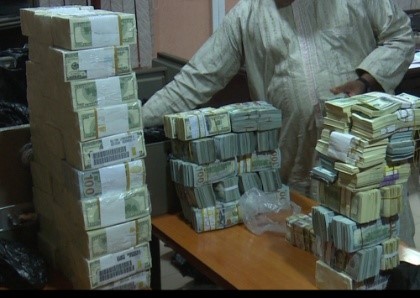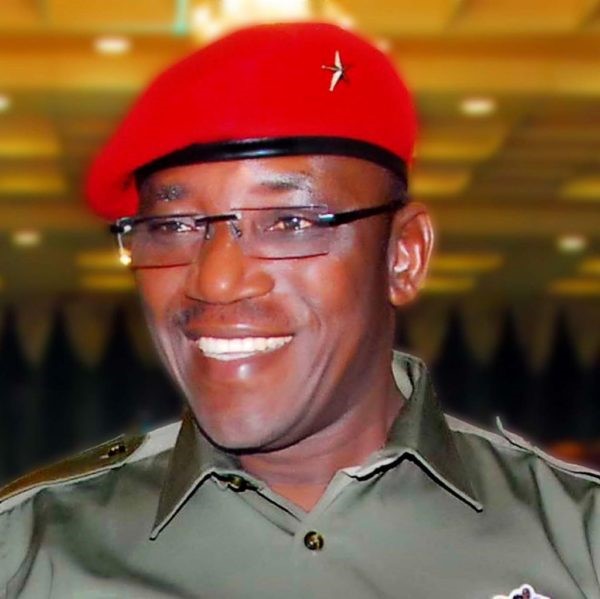To say that the whistle blowing policy of the Federal Government has yielded amazing results since its introduction is to put it mildly. In recent time, huge sums of money have been recovered from all sorts of places to the consternation of Nigerians.
The discovery of $9,772,800 and £74,000 by operatives of the Economic and Financial Crimes Commission (EFCC) in the Kaduna home of Andrew Yakubu, a former Group Managing Director of the Nigeria National Petroleum Corporation, is perhaps the first high-profile case in such revelations that have since riveted the attention of the people. The raid on Yakubu’s house was sequel to intelligence made available to the anti-graft agency.
As Nigerians struggled to come to terms with the fact that just one man could keep such staggering amount in his house, the ex-GMD NNPC showed up at EFCC’s office to unabashedly claim the funds, insisting they were gifts from friends.
Before the din provoked by the Yakubu saga could settle, N49 million mysteriously showed up at the Kaduna Airport and up till this very moment, the ownership of the money has not been established. Within a few weeks of the Kaduna Airport discovery, another N250 million was recovered at Balogun Market in Lagos.
Following quickly on the heels of this was N449 million found at a bureau de change shop on Victoria Island also in Lagos. But the discovery that took place on April 7, at Osborne Towers on Osborne Road in Ikoyi, Lagos not only ranks as the most prominent so far, it has generated the most controversy. A total sum of $43.4 million, N23.2 million and 27,800 Euros were recovered in this latest EFCC’s operation.
The Nigeria Intelligence Agency (NIA) has claimed the ownership of the money. First, why would an agency of government keep huge sums of money in a private apartment and not in the Central Bank of Nigeria?
Second, why not the NIA offices which should be far safer to keep such funds? We commend the Federal GoverOsinbajo-led panel to probe the transactions. This is a test case for the Muhammadu Buhari’s administration in the fight against corruption.
One thing however that has come out clearly in all these disclosures is that the whistle blowing policy has not only been a success since its introduction, it has the capacity to assist in the diffi-cult fight against corruption.
The government was not unmindful of this when it said through the Minister of Information and Culture, Lai Mohammed, that: “Since we launched the whistle-blower policy, we have received immeasurable support from Nigerians.
Yes, there is monetary reward for any information that leads to recovery of looted funds, but from what we have seen, most of the Nigerians who have come forward with useful leads were driven by patriotism rather than reward…” Great as this sentiment is, it is imperative that those identified as owners of such money should be quickly prosecuted and the cases dispensed with. In this regard, an incorruptible and upstanding judge should be put in charge of such cases.
If it also becomes necessary to have a dedicated court to try such matters, then the Federal Government should not shy away from it. Also, more people should be encouraged to come out with information about money stashed away whether in forests, cemeteries or such other unlikely places by thieving public officials in a bid to escape detection.
And one way of ensuring this is to quickly pay the agreed percentage to such whistle blowers once the authenticity of their claim is verified and the cases dispensed with. Government should not delay in this regard as that could discourage would-be whistle blowers.
Again, the whistle blowing policy should not be restricted to the federal level. It is not only at that level that unscrupulous elements have helped themselves with the collective wealth of the people. So, we insist that the strategy should be extended to the other tiers of government: the state and local.
This will ensure that the policy is not only all-encompassing, it will also be more effective in recovering looted funds across the country. However, as good as the policy is, effort must be made to safeguard it from abuse.
Fears have been expressed, and they are not unfounded, that political opponents may begin to view and use the policy as a tool of vendetta. In this regard government must be vigilant.
Government must also let the people know how much money has been recovered at any point in time and what the funds will be used for. This will further give credibility to the whole process.
Government should also spell out in clear terms the projects the money will be spent on and make sure that is actually the case. It wouldn’t do good to have the looted funds looted again.
















































